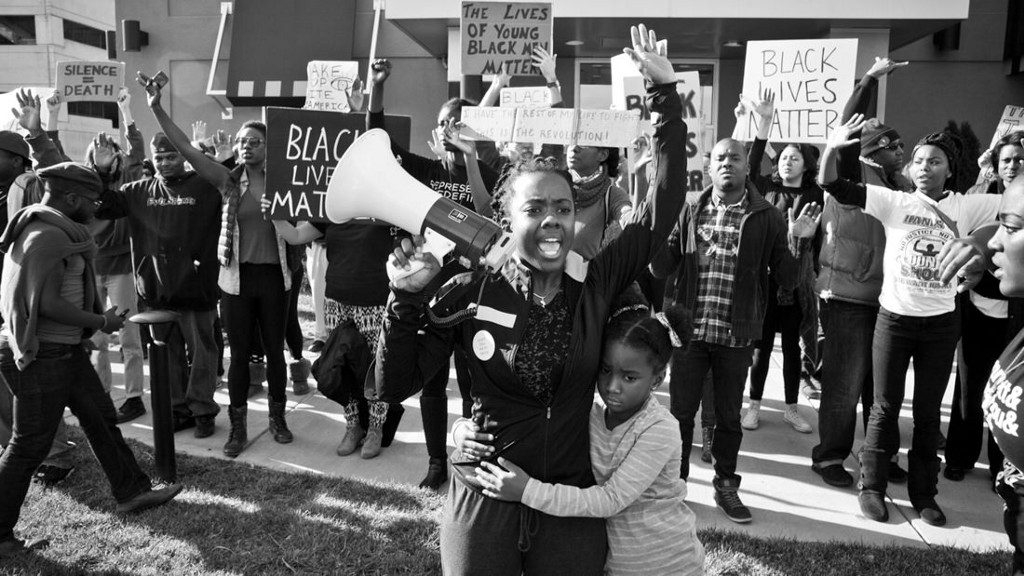Sabaah Folayan is a storyteller and activist based in Brooklyn, New York. She was a lead organizer for The Millions March, one of the largest marches for racial justice in New York history. “Whose Streets?” is her directorial debut.
“Whose Streets?” will premiere at the 2017 Sundance Film Festival on January 19. The film is co-directed by Damon Davis.
W&H: Describe the film for us in your own words.
SF: “Whose Streets?” is a documentary for the people. We honor those who put their lives and livelihoods on the line to fight for our constitutional rights.
When Michael Brown, Jr. was killed, the media focused on the most sensational aspects of the story. I didn’t see anyone digging deeper — trying to understand what this community was experiencing.
This film is the untold story. Our vantage point is the streets and homes of everyday St. Louisans.
W&H: What drew you to this story?
SF: Police violence has been a reality for as long as I can remember, but Ferguson was a tipping point because of the images circulating on social media. Seeing these images, I was struck with a sense of powerlessness that I needed to overcome.
While the media focused on the most sensational parts of the situation, all I could think about was what Michael Brown Jr.’s family, friends, and community must be thinking and feeling. I wanted to tell that story.
W&H: What do you want people to think about when they are leaving the theater?
SF: I hope that this film can transform people’s ability to empathize with the Black experience. And I want it to remind people that we can never take democracy for granted.
W&H: What was the biggest challenge in making the film?
SF: Treating such a raw subject as a story — in the narrative sense — was extremely difficult. What happened to Michael Brown Jr. happens to people of color everyday across America.
As a storyteller, that awareness and the pain that comes with it is an important part of the process, but it can be hard to navigate.
W&H: How did you get your film funded? Share some insights into how you got the film made.
SF: Our film was supported by a group of incredible partners at non-profit film organizations as well as individual donors.
W&H: What does it mean for you to have your film play at Sundance?
SF: I am humbled by this opportunity. It means that people who have gone unheard for a very long time will get to speak on a significant stage. It means that everyone who supported me personally and professionally can feel proud. And for me as an artist, it means I have the opportunity to share a moment with some of the most talented and influential media makers of our time.
W&H: What’s the best and worst advice you’ve received?
SF: Best advice: After two months in Ferguson, debating whether I had made the right choice in dropping my pre-med path to pursue film, I got the opportunity to speak with the renowned Dr. Cornel West. I told him my story and he took my hands in his and said, “Follow your heart.” It was so cliche! But it struck me that if he of all people couldn’t — or wouldn’t — guide me, then I’d have to chose my own path. I haven’t looked back since.
The worst advice I ever got was to be less ambitious.
W&H: What advice do you have for other female directors?
SF: Don’t be afraid to stretch yourself and learn on the job. Sometimes we have too much anxiety about being perfect and it stops us from taking risks.
Think about ways you can use the skills you already have to help you step out of your comfort zone.
W&H: Name your favorite woman-directed film and why.
SF: Jehane Noujaim’s “The Square” was a big influence in creating “Whose Streets?” The film struck a balance between the personal and the political, delivering hefty information without losing an audience’s attention, or sacrificing emotional engagement.
I also appreciated the creative approach Noujaim took by showing the creation of a mural, which represented the story on a symbolic level even as it was unfolding in real time.
W&H: Have you seen opportunities for women filmmakers increase over the last year due to the increased attention paid to the issue? If someone asked you what you thought needed to be done to get women more opportunities to direct, what would be your answer?
SF: While many admirable efforts are being made to increase opportunities for us to direct, there is still a long way to go. I think everyone will have to change the way they think and act in order for us to achieve gender equality in directing.
This means men, and gatekeepers in general, are going to have to be willing to take chances on promising women directors, and women are going to have to be bolder than ever in asking for the recognition they deserve.







